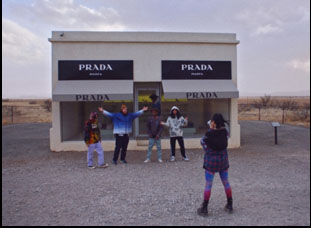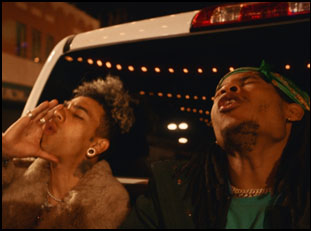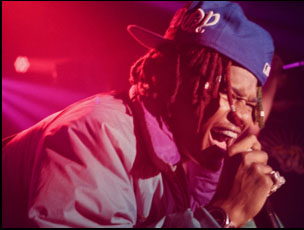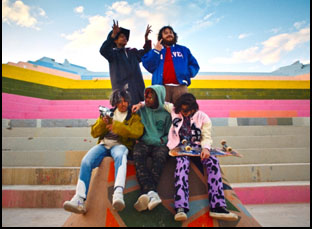Claire Macdonald, the production designer on “Lost Soulz,” knew that home should look a little different on Katherine Propper’s sensational drama about a collection of itinerant rappers roaming West Texas in search of a sense of belonging, only she hardly knew it would look so radically different for herself, having to look for a place to stay after a deal she struck for an apartment turned bad.
“She literally was sleeping on my couch the whole movie because she got scammed on Facebook Marketplace,” recalled Propper, who watched as MacDonald fashioned a real domicile on wheels for the production in the van that the rappers pile into one by one to create a community for themselves. “She hand tattooed and spray painted the van black and decked out the interior and made it conducive not just for us to film, but for the actors to feel like they’re really touring, and she helped us figure out like, ‘If you guys are here [with the monitors in the back of the van], we can keep this [seat] high enough so that we don’t see your heads,’ just like random stuff like that. And three of us sat in the trunk, and then our DP was in the center console, [sitting on] a sandbag-type chair in the middle [to film]. She really made the van everything that it is.”
The writer/director couldn’t have explicitly planned for any of this to happen, but it’s indicative of how real life often finds a way to enrich her productions and the level of investment her collaborators end up having, a quality that dates back to her arresting 2019 short “Street Flame,” which was set around an Austin skate park and the group of teens whose lives snap into focus upon having to grieve the death of a friend. Sauve Sidle, one of the stars of that film, can be seen now leading Propper’s feature debut as Sol, an aspiring musician who seizes the opportunity in front of him when he finds a way to escape trouble at a raucous house party that brings the cops around when he’s invited by the group of rappers hired to play the gig that he’s part of the act, only for all of them to get into a little more by hitting the road together with no particular destination in mind.
They may seem aimless and alienated from the broader culture, all making music to have their voices heard when they feel they aren’t allowed to raise them elsewhere, but Propper has a stronger idea of where this is all going as a common language develops amongst the artists that allows them to reframe their experience in order to understand it, just as the director finds the poetry in envisioning the world through their eyes where their restlessness starts to make sense. Naturally vibrant by virtue of its soundtrack and wily cinematography, “Lost Soulz” is well worth going along for the ride and after cruising the festival circuit last year, the film is starting its theatrical tour where the entire band is getting back together for stops in New York, Austin, Nashville and Los Angeles starting this week and we were fortunate to catch up with Propper to talk about the inspiration for her debut feature, keeping her process open to discovery and why the opening house party feels so authentic.
Katherine Propper: I met Sauve a month into moving to Austin, Texas to do my MFA at UT. I put up a post seeking actors for a school project and Sauve was the only one that responded. I really lucked out because even as a high schooler, Sauve was super charismatic and compelling. He had rainbow colored hair and grills and already looked like a rock star the first time I met him and was very open and enthusiastic even then about just the possibility of being an artist and a musician and an actor. He wanted to do it all even at age 16. We made a short film “Street Flame,” a couple of years later, and that was one of my first experiences working with first-time actors that I just cast hoping that things would work out on set and I immediately knew that Sauve was such a natural at acting. Working with a large ensemble group of actors, I could tell what Sauve had was a bit more natural and perfect for camera and I told Sauve, “You can really act if you want to. The camera loves you and you know how to be yourself and natural without coming off like it’s acting or that it’s fake.”
We just kept in touch and had that supportive relationship because Sauve’s like, “You’re gonna be a filmmaker and I believe in you,” and Sauve was like, “If you ever want to do another film, “Let’s do the sequel. I’m down, I’m in.”
I didn’t know with certainty that I wanted to make a feature version of “Street Flame,” but I knew that I was interested in working with Sauve again and when the film came out at Tribeca in 2019, Sauve had already moved out to L.A. at that point and then had his own meteoric success being a SoundCloud rapper and ended up going on a world tour with Juice WRLD before he passed away, and they’re famous now, but [he was part of] the hip hop crew in LA with Lil Mosey, Kid LAROI, and Lil Tecca. I would just keep in touch with him on social media and sometimes I would call and [he’d say], “Oh, I’m on tour in Iceland right now.” And then at the same time, whenever I would be in L.A. and hit Sauve up, he’d also say, “Times are tough. I don’t have any money. I’m just crashing at friends’ houses.” So there was like this dichotomy of extreme highs and lows of pursuing being a musician in L.A. and then having really extreme things in his personal life, not having that stability.
I was thinking about those things, and then separately in Austin, I was pursuing my MFA, but even after that, just trying to figure out how to make films and in my second year of film school, my younger brother who was 16 ended up having to move in with me and he had his own issues. I just made “Street Flame” about lost, itinerant kids and then there I was being my younger brother’s caretaker in Austin and navigating high school for my brother in Austin, so I was thinking about how hard it is to pursue a dream and be an artist when you don’t feel like you have a support system or maybe don’t have like a conventional family situation or a home base. Those things were personal to me, and then looking at what Sauve was doing, I felt like there was something cultural that transcended my personal narrative that I think a lot of young people can relate to if they’ve come from a background where, for whatever reason, they don’t have something stable and I wanted to make a movie about that. That was “Lost Soulz.”
I also thought I could make a cool music film because I love pop culture and hip hop music and wanted to make a film about being young that like doesn’t condescend to young people, but celebrates the things that people aspire to when you decide to pursue these pipe dreams that people tell you are bad ideas and show the soulful, caring part of people who you don’t always think have that side to them, especially with young men. I was thinking about that with my own younger brother living with me. He’s such a sensitive, emotional person, but he never shows it. And I [thought] I want to make a movie that like shows that side.
 With a feature, you need to plot things out more, but I know “Street Flame,” you really opened up the process to discovering what the film was along the way. I’ve heard, for instance, there was a music session in New York a few months before shooting that might’ve changed the trajectory of this, so how did you create a process that would work for yourself?
With a feature, you need to plot things out more, but I know “Street Flame,” you really opened up the process to discovering what the film was along the way. I’ve heard, for instance, there was a music session in New York a few months before shooting that might’ve changed the trajectory of this, so how did you create a process that would work for yourself?
I think that I’m a very pragmatic person, so I learned not just on “Street Flame,” but I made a follow-up short film called “Birds” also with an ensemble of young actors, what the challenges were when working with scripted narrative and also incorporating improv and the truthfulness of the people if they’re playing characters similar to themselves, reacting naturally to imaginary circumstances, which is what acting is. I wrote the script with a skeleton that I hoped would be enough to springboard off of and have those improvisational moments and spontaneous things that could occur and I had faith that if I got the right locations and the right people, and they were all like interesting, compelling, and they knew that the process was going to be very free and curious and dynamic and spontaneous. But if not, we had a script to fall back on.
When you have a low budget, you’re like, “Okay, well, we have a plan B, a plan C, and a plan D when that location falls through and that person drops out and that person gets sick and that light falls down, so what do we do in that moment? Let’s adapt, let’s like make things up.” That’s where I was really blessed. I had producers who were very inexperienced themselves in scripted narrative feature filmmaking, so I think they were really open to working the process that I was suggesting, which [was] “Hey, this is the plan, but I want to be really open to throwing out the plan if something better comes along.” And I was lucky that I had collaborators who were supportive of that and even having that mystery and uncertainty guiding the set. With a lot of producers, you have to know exactly what you want and be able to articulate that vision, and I have a vision, but I also was really excited about the idea that like something better than my vision might happen in front of me spontaneously, or that like life would happen in front of us and that would be like magical in its own way.
Then the New York band camp, I [thought] we have access to a bunch of real musicians who are in the cast, who write their own verses and are songwriters in real life and not only are they musicians, but some of them are also composers and producers and beat makers and instrumentalists, so having an ensemble film like that, you get to utilize everybody’s talents and everybody’s strengths come through collaboratively. So in that band camp, we had four members of the cast who were able to make it to New York [as well as] a sound engineer, a music producer, and an additional songwriter, and then people brought their friends and siblings, so it was honestly like a party. And some people had read the script. Some people had just looked at our pitch deck, which had the summary and the logline, but [the idea was] “Let’s make music for this.” There were definitely some songs where we had references, like it was like, “This one is supposed to be like a Championship song, [or] this is like Drake, or this one’s like Brockhampton-y.”
But the musicians are just so talented. Malachi Mabson, who’s the driver in the film is an amazing producer and just one of the best piano players in the country. He’s the keyboardist for Yeba and Jimmy Fallon, and there were many musicians not even on screen — they’re in the credits — that were really amazing songwriters and beat makers and instrumentalists. We had Bass Face, this sound engineer from Philly who works in New York, and a lot of musicians who are often in the room for those really big hits that get produced by Pharrell or whoever, but don’t get credited sometimes.
 The energy in that room permeates the entire film, starting with that huge, wild house party. How’d you manage to find such a place and a crowd to throw that kind of bash?
The energy in that room permeates the entire film, starting with that huge, wild house party. How’d you manage to find such a place and a crowd to throw that kind of bash?
That was an actual frat house that we filmed at, and I wrote it in the script as this West Campus Austin frat house because I lived really close to those frat houses when I went to UT. I really wanted to film at one of the ones that looked like a big plantation, which some of the frat houses at UT do, but a lot of those fraternities, which are like Fiji and the sons and daughters of the Bush family kind of thing were not easy to get access to. But there’s this one fraternity of more offbeat, cool, hipster-y guys who said “Yeah, you can film at our house. We like film, we have the Criterion Collection.” [laughs]
But [we were going to be shooting on] a school night and they lived there, so it was like, “Yeah, you can film here like 5 p.m. but you have to be out by 3 a.m.,” so they gave us limitations, but I’m so grateful to those fraternity brothers who allowed us into their actual living space and let us throw basically a real party on their front lawn. They’re used to throwing parties all the time, so that was normal, and it wasn’t a real party in the sense that it wasn’t just a lot of random people roaming around. It was like a quieter party, but the performance part of the party was [such that] people were [going], “What’s that? I’ll just show up to that concert right there on the front lawn.”
 After hitting the road to make the film, what’s it like now to travel with the finished product?
After hitting the road to make the film, what’s it like now to travel with the finished product?
The festival tour was really amazing and it took me to different cities in America and even abroad to London and in Spain. I haven’t actually done the road show yet. I leave May 1st to go to New York and we’re starting at the Roxy Theater in New York City and then we drive to Nashville and then Dallas and then Austin and then Houston, and then back to LA for the premiere on May 11th at the Laemmle North Hollywood, and I’m really excited about it. I don’t know what’s going to happen. It’s a small movie that doesn’t have a national P & A campaign, so it’s about getting the word out and in L.A., I’ve been putting flyers up on Melrose and random areas, just doing my own DIY marketing. I think a lot of people would respond to the film and be excited about it, but they just don’t know about it.
“Lost Soulz” opens on May 3rd in New York at the Roxy Cinema and Toronto at the TIFF Lightbox, a special one-night event at the Belcourt in Nashville on May 8th and on May 10th in Los Angeles at the Laemmle NoHo 7 and Austin at the AFS Cinema. A full list of theaters and dates is here.





